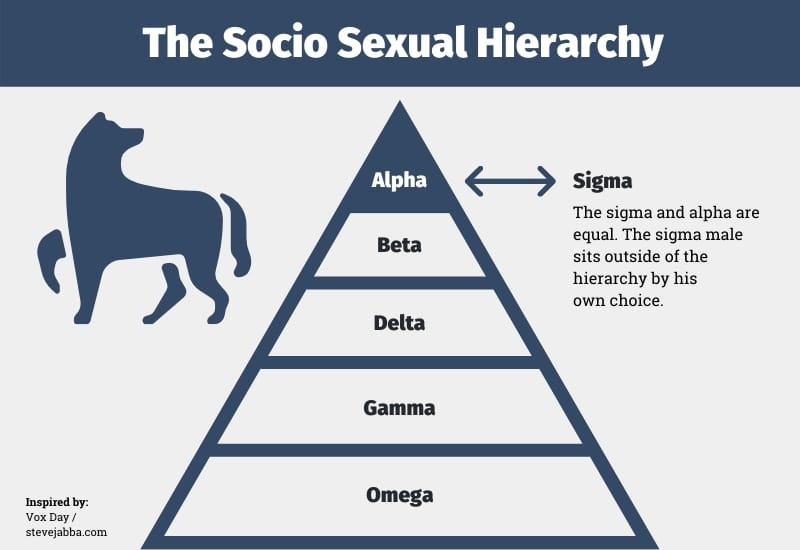What is a delta male?
The delta male is the most common type of man in the socio sexual hierarchy. They’re the backbone of society and consist of ‘normal’ guys who show up to their jobs and lives, contribute to society, and take pride in those contributions. But this is also the archetype that is most likely to move up or down the hierarchy as they develop themselves, or as the hierarchy itself shifts and changes.
Digging deeper to the above, what does it mean to be a delta, and how do you know if you may be one?
And perhaps more importantly, what does being this archetype mean for you as a man?
In this post, we’re going to dive deep into the delta male archetype.
You’re also going to learn the most common delta male traits, and the advantages and disadvantages that come with them.
Skip Ahead
The Socio Sexual Hierarchy and Where It Comes From
First off, where did the designation of ‘delta male’ even come from?
The answer is the socio sexual hierarchy.
According to its creator, Vox Day, the socio sexual hierarchy is a system for categorizing “how men and boys relate to one-another, what you are, how you behave, and what your natural inclinations are likely to be.”
Men are divided into 6 ranks, or ‘archetypes’ within the hierarchy. These ranks are:
Every rank has its own distinguishing traits and characteristics. And in this post, we’re going to specifically examine the delta male archetype.
Where Do You Rank? Take This Simple Quiz
Find out your socio sexual hierarchy rank now by answering 10 quick questions.
You’ll get your ranking immediately:
A Quick Disclaimer
Vox Day, the creator of the Socio Sexual Hierarchy system, is a man steeped in controversy.
His views aren’t very popular among those who disagree with him, and he tends to be especially unpopular among liberals, feminists, and anyone else who is predisposed to hating anything that has to do with the ‘manosphere.’
Now, with all of that being said, here is my take on Vox Day’s socio sexual hierarchy.
I don’t necessarily agree with everything Mr. Day puts out. I’m not an expert on all of his views, and certainly don’t share the extremity of his views on every issue.
But, as a man deeply committed to understanding human behavior, I find the socio sexual hierarchy fascinating. And it doesn’t take a rocket-scientist to see that, at least to a certain extent, Mr. Day seems to be correct in his assessment of the categorization of the different ‘roles’ men play in society.
For this reason, I see the socio-sexual hierarchy as a valuable self-awareness tool for men. It’s a system that we can use to increase our own self awareness in an attempt to become better men as we live, learn, and work.
I don’t believe that Vox Day’s hierarchy should be the ‘be all, end all’ for how we categorize ourselves or others as men. We’re all different, and we’re all at different places in life.
In fact, even Vox Day himself described the socio sexual hierarchy as ‘fractal’ and context-dependent.
Long story short, we’re all striving to become better men. And if looking at the socio sexual hierarchy can increase our self awareness and help us to do that, then I see it as valuable.
So with that being said—let’s dive in and talk about the delta male.
Where Does the Delta Male Fit on the Socio Sexual Hierarchy?

The delta male is the ‘normal’ guy in the socio sexual hierarchy.
He isn’t a leader like the alpha. He’s relatively easy to please, and he takes pride in his role.
Delta males often get married, have families, and fulfill normal (yet important) roles in the community.
They may be blue-collar workers, police officers, teachers, factory workers, bank tellers, retail workers, etc.
But they’re also arguably the most important part of their associated hierarchies.
Why?
Because delta males are the men who do the work and get things done.
They show up to their jobs, they put in their time, they contribute to society in a meaningful way, they spend money on the things they enjoy, and they keep society moving forward.
They also define the success and smooth-functioning of organizations, projects, operations, and hierarchical groups.
The better a hierarchy is at rewarding and caring for its deltas, the better-off that hierarchy is going to be. Nowhere is this more plainly seen than in the corporate workplace.
A company that takes care of its workforce, provides it with benefits, gives bonuses, and makes sure to dole out enough perks to keep everyone happy and content is an example of a company that is effectively caring for its delta workers.
This speaks directly to company culture. Gary Vaynerchuk is perhaps a thought-leader on how to effectively accomplish this.
Deltas are the guys on the assembly line. They’re the everyday men who roll up their sleeves and make sure that work gets done. Without deltas, the alpha has nobody to command, and the sigma has no societal infrastructure within which to practice his freedom.
Without deltas, every hierarchy collapses.
When deltas collectively choose to leave a hierarchy, everything crumbles and turns to chaos (this is what happens when workers go on strike).
Delta Male vs Alpha Male
If the alpha wishes to be successful as a leader, he must appeal to the deltas under his command.
Deltas demand respect for their contribution to society, and they take pride in performing such vital functions within the hierarchy.
They also want recognition for their hard work.
Smart alpha males understand that alphas and deltas need each other. The alpha draws his power and status from his position at the top of the hierarchy. But all of the energy that sustains the hierarchy and feeds his status and power comes from the deltas within that hierarchy.
Therefore, successful alphas become successful by learning how to successfully lead, please, and adequately reward deltas for their hard work within the hierarchy.
Deltas, unlike gammas, don’t usually wish to become alphas. In fact, advanced deltas come to see alphas for what they truly are—lofty servant-leaders whose entire purpose is to provide a better structure for deltas.
As long as deltas and alphas can come to the negotiating table and agree on mutually-beneficial roles and terms, these two archetypes have one of the most rewarding relationships within the socio sexual hierarchy.
Delta Male vs Sigma Male
Deltas thrive within the stable framework of the social dominance hierarchy. The more stable this hierarchy is, the better it becomes for the delta way of life.
Sigma males, on the other hand, are men who choose to walk away from the dominance hierarchy altogether. However, choosing to leave the hierarchy comes with its own risks.
There has never been a better time to be a sigma than in these modern times—because in the context of our modern-day society, it’s much safer to walk away from the hierarchy/tribe than it used to be.
This speaks to positive societal progress. But this progress was mostly built upon the shoulders of the delta men who came before us.
For example: The birth of successful agriculture was only made possible by the hard work and labor of the ancient human delta workforce.
The industrial revolution was powered by the blood, sweat, and work-ethic of the delta men who lived and worked in the late 1700s.
The first and second World Wars were won by men in the trenches—the vast majority of which were deltas.
As a result, we live in a world where sigmas have inherited the opportunity for individual freedom without many of the dangers (predators, enemies, starvation, disease) that would have made leaving the tribe a much more risky (or even deadly) affair a scant 10,000 years ago.
And to a great degree, this is owed to the labor and sacrifices of the delta workforces of history.
(Michael Shermer does a great job of describing how the world has actually gotten a lot better and safer in his bestselling book The Moral Arc: How Science Makes Us Better People. This is an interesting read for people who struggle to see how much good has been accomplished in the world as a result of scientific advancement.)
Are You a Delta? 7 Traits of a Delta Male
1. They’re the Most Likely Archetype to Move up or Down in the Hierarchy
One of the most interesting aspects of the delta male archetype is the fact that they’re the most likely archetype to change their station within the hierarchy at some point in life.
Deltas can ascend to beta rank, or can even become alphas if they’re motivated enough to do so.
Deltas can also dip into intellectual idealism and cross over into gamma male territory—or, they can ‘take the black pill,’ strike out with women, become disillusioned with life, and become omega males.
2. They’re the Men Who Actually Get Work Done
Delta males are the men in the trenches. They show up, clock in, get their work done, clock out, and go on to pursue their hobbies, interests, and whatever other extracurricular escapism brings them happiness.
If you have a regular job where you clock in for work at a certain time to perform a certain function every day, and you aren’t the CEO or owner of the company—odds are good that you’re a delta male in your workplace hierarchy.
3. Deltas Pride Themselves on Competence
Delta males take pride in their work, and strive to do it well. They can also quickly become disillusioned with a workplace if the leadership makes doing good, prideful work impossible.
For example: I used to work at a massive retail outlet store. At this store, leadership often made conflicting decisions that almost made it impossible to get meaningful work accomplished.
This made the job feel like a ‘soul sucking black hole’ to many of the workers, and the turnover rate was extremely high as a result.
This is an example of ‘delta male disillusionment.’
Delta males want to do a good job, and they want to take pride in it. If they aren’t allowed the appropriate environment to accomplish this, they’ll quickly become disillusioned and lose faith in the hierarchy leadership.
4. They Don’t Want to Lead
Delta males generally don’t have leadership ambition. They want to show up, do what they’re paid to do, clock out, and spend their free time enjoying whatever forms of escapism they wish to pursue.
As long as they’re allowed to do their work, are compensated fairly, are recognized for their contribution, are treated with respect, and are provided with an environment conducive to taking pride in what they’re accomplishing—they tend to remain content and happy.
5. They’re Disinterested in Pleasing the Alpha
Unlike betas or even gammas, delta males have little interest in pleasing the alpha.
They respect alphas who can maintain a strong, functional hierarchy. And by contrast, they tend to dislike alphas who fail at this.
Advanced delta males often see the alpha as a servant of the people. And if he can’t fulfill his role adequately, they’ll seek to remove him and replace him with someone who they believe will do a better job.
(If you think that this sounds like a democracy, you would be correct. The democratic system gives deltas the power to affect change over their own hierarchies—and it tends to work quite well when effectively employed.)
6. They Desire Respect
Deltas demand respect for their hard work and contribution to the hierarchy.
Any hierarchy that fails to respect, acknowledge, value, and reward the hard work of the deltas within it is usually a stone’s throw away from erosion.
This stands to reason, because deltas bring the greatest value to the hierarchy in terms of work accomplished, though they reap fewer benefits than the alphas or the betas.
For this reason, wise leaders and managers will make sure to cater to their delta workforce.
This is why the idea of the ‘servant leader’ is such a successful and universal principle.
7. They’re Just Successful Enough with Women to Raise Families and Have Children
Deltas aren’t as successful with women as alphas, betas, and sigmas.
But they’re definitely more successful than gammas and omegas.
Deltas are very average by definition—and women tend to prefer men with higher status, more power, and greater resources.
This is why Vox Day describes the institution of monogamy as “one of the biggest achievements of western civilization.”
Monogamy keeps the alphas and betas from hogging all of the desirable women, leaving more women to marry deltas. This gives rise to the traditional family dynamic, which is good for deltas—and in turn, good for society.
Benefits of a Delta Male Lifestyle
The main benefit to being a delta male is the simplicity of it.
Delta males are pretty sexually successful in the sense that they’re usually coupled with women who are somewhere near their same social position and level of attractiveness.
So in the grand scheme of things, delta men tend to do pretty well with the ladies.
Delta males also enjoy a lot of the benefits offered by a stable social hierarchy.
They make good enough money to live well, and they experience less stress than almost all of the other positions within the hierarchy—with the only real exceptions being betas and sigmas.
They tend to marry, buy houses, build up a retirement fund, and have children.
Drawbacks of Being a Delta Male

The main drawback to being a delta male is that high value women who date or marry them may eventually tend to want to ‘upgrade’ to men with more status, income, and power.
Women often settle down with delta men while secretly fantasizing about either cheating with alpha men, or branching off and upgrading to one altogether.
A delta who is on his game can head this off by leveling himself up and maintaining his high value in the sexual marketplace. But this requires extra work that delta males struggle to keep up with.
Deltas who let themselves go (gain weight, stop working on themselves, etc.) face the danger of being left/divorced if their wife/girlfriend gets a chance to branch off to a man with more money, better looks, higher status, more power, etc.
Conclusion
Are you a delta male?
Hopefully, this post has helped you to answer this question for yourself.
Of course, the key to leveraging the socio sexual hierarchy successfully is to use it as a tool for understanding yourself better.
When we do this, we can put in the work required to become better, happier, and more successful as men. And that makes our lives better.
Want more tips, tricks, and advice for men? Check out our YouTube channel.
Go with grace, gentlemen. And never give up your power.
FAQs
Are women attracted to delta males?
Yes, women do tend to be attracted to delta males to a certain point—though if given the chance, they’ll usually choose an alpha or a beta over a delta.
What can delta men do to increase their dating success?
Delta men who hit the gym, work hard to increase their income, invest their money wisely, and level-up to become high value men can get great results in the dating marketplace.
At some point, delta men who continue to work on themselves and increase their value usually cross over into alpha male territory—and this gives them their best odds for success with women.
Is it unattractive to be a delta male?
Delta males are ‘normal’ guys. And as such, they’re neither considered especially attractive nor especially unattractive based solely on their socio sexual archetype.
The individual choices a delta male makes, therefore, will have a profound impact on how attractive or unattractive he can become. It’s all about increasing your value, becoming a more successful man, and keeping your head in the game.

















